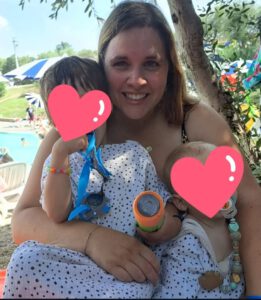When I first met Annika, she was just beginning her work with us at the kindergarten. Only a few months later, her life shifted – she became a mother. And before long, her second child followed. With two little ones so close in age, her days at home quickly filled, and for more than four years, I didn’t see her regularly. Apart from an occasional social gathering or a WhatsApp post, Annika’s world seemed to move quietly in a different rhythm.
Part of this is because in Germany, mothers and fathers have the opportunity to step away from work for a longer period. It begins with Mutterschutz, or maternity protection – which covers the weeks before and after birth, ensuring both income and job security. But beyond that, there is also Elternzeit – parental leave – which allows parents to stay at home with their children for up to three years per child, while their job remains protected. What may sound unusual in some countries is quite normal here in Germany.
For Annika, this meant stepping away from working in the kindergarten not only during her first pregnancy, but also through the early years of raising both of her children. While I didn’t see her much during those years, I often found myself wondering how her journey was unfolding. When she finally returned, I was curious to know more – and grateful when she agreed to share her story here.
Finding Joy in Motherhood
Becoming a mother changed everything for Annika. At first, the adjustment was huge: suddenly being at home all day instead of working felt strange. But in that quieter season, she also discovered something new – crocheting. It became a small joy, allowing her to create things for her children, even a handmade doll.
She spent over four years fully at home, a season she describes as both fulfilling and transformative. “I really enjoyed my years at home,” she says. “Of course, I missed my work at times, but I was also grateful for that chapter of life. And when I knew the time had come to return, I was glad – glad to not only be Mama, but also to be myself again.”

Motherhood also reshaped how Annika sees herself as a woman. She found that her values shifted: “I now care much more about inner qualities than outward appearances.” This deeper perspective continues to guide her in her daily life.
Annika is quick to point out that she didn’t walk this path alone. Her family was always nearby when she needed them, giving her space to breathe and recharge. And her husband has been a steady partner, helping with the household and sharing bedtime routines with the children.

After such a long pause, returning to work felt exciting and refreshing. “I was so happy to go back,” she recalls with a smile. “To simply be myself again, to be able to go to the bathroom alone 😅, to meet new people, and to share ideas.”
Looking ahead, Annika doesn’t dream of the extraordinary. Her hopes are simple but full of wisdom: to live a long and happy life, to remain joyful, courageous, and full of drive. To give each day the chance to become one of the most beautiful. To give love to those around her, supporting and strengthening them along the way. And above all, to stay healthy. 🥰
For Annika, motherhood is not about perfection. It’s about presence, love, and the quiet courage to grow alongside her children – while still holding onto herself.
My Reflection on Annika’s Journey
Reading Annika’s story made me pause and think about how different motherhood can look depending on where we live. Here in Germany, the system of Mutterschutz and Elternzeit gives mothers and fathers the possibility to step away from work and truly spend the first years with their children. It is a privilege not everyone has.
I remember my years in the UAE, watching colleagues work right up until the final days of their pregnancy and then return to their jobs only a few weeks later. I’ve seen the same in the Philippines, where I myself had no choice but to go back to work just a few months after giving birth. My son was still fragile with health issues during his first year, but I had to hire a nanny and keep going. I needed the money, and there was no safety net that allowed me to simply stay home.
That is why Annika’s journey strikes me as both beautiful and important to share. It shows what is possible when society values families enough to give them time. Time to bond. Time to rest. Time to grow into motherhood without the constant pressure of “what comes next.”
Not every mother will have this privilege. And that is precisely why I see Annika’s story as a blessing – not just for her, but for all of us who can be reminded of the simple truth that motherhood deserves space, patience, and presence.
Her story is a quiet invitation: to appreciate the systems that support us, to advocate for mothers where they are lacking, and to hold close the moments we are given with our children.
